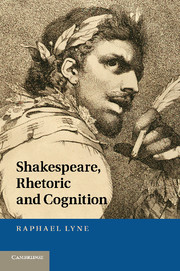Book contents
- Frontmatter
- Contents
- Acknowledgments
- Chapter 1 Introduction: ‘pity, like a naked new-born babe’
- Chapter 2 Metaphor and synecdoche in cognition
- Chapter 3 The drift towards cognition in rhetorical manuals
- Chapter 4 A Midsummer Night’s Dream
- Chapter 5 Cymbeline
- Chapter 6 Othello
- Chapter 7 The Sonnets
- Conclusion
- Notes
- Bibliography
- Index
Chapter 2 - Metaphor and synecdoche in cognition
Published online by Cambridge University Press: 07 September 2011
- Frontmatter
- Contents
- Acknowledgments
- Chapter 1 Introduction: ‘pity, like a naked new-born babe’
- Chapter 2 Metaphor and synecdoche in cognition
- Chapter 3 The drift towards cognition in rhetorical manuals
- Chapter 4 A Midsummer Night’s Dream
- Chapter 5 Cymbeline
- Chapter 6 Othello
- Chapter 7 The Sonnets
- Conclusion
- Notes
- Bibliography
- Index
Summary
In this chapter I hope to elaborate upon the connection between rhetoric and cognition suggested by Macbeth’s simile. It is necessary to reiterate that this will remain fundamentally an argument about, or at least leading towards Shakespeare, in whose works the two are intimately, heuristically associated. However, this Shakespearean phenomenon will also be taken, to some extent, as revealing or proposing something that spreads beyond Shakespeare’s works into the disciplines of rhetoric and literary criticism more generally, and indeed into ideas about how language and thought work. This chapter will, I hope, be usefully poised. On the one hand, it is committed to the assertion that rhetoric and cognition might be associated even outside Shakespearean (or other) drama – outside a sphere where characters can only think anything in language or in a hypothetical form that is inferred through language as a fictional necessity (i.e., put simply, to say X, this character must be thinking Y). On the other hand, it acknowledges the limit of that assertion. Interdisciplinary theories of metaphor, conceptions of the brain in cognitive science and cognitive linguistics, and renaissance rhetoric intersect in suggestive parallels, tellingly shared patterns, and momentary flashes, rather than being reconciled in a fully coherent and complete way. These intersections nevertheless survive the challenges posed by historical distance and varying models of language and cognition. Even without setting out a unifying theory, if such a thing is truly achievable, it is possible to suggest that in our reading of Shakespeare a rapprochement, if not a unification, comes into being. Modern minds meet renaissance rhetoric in these plays. We have to think through what is being said.
- Type
- Chapter
- Information
- Shakespeare, Rhetoric and Cognition , pp. 28 - 67Publisher: Cambridge University PressPrint publication year: 2011



